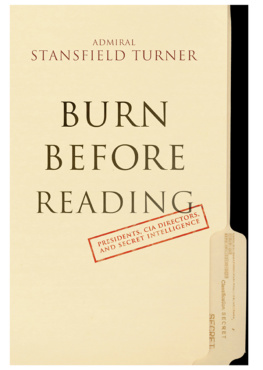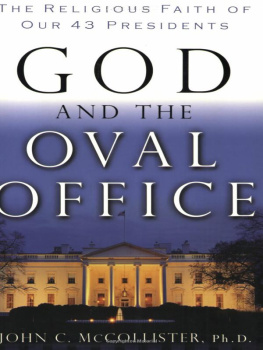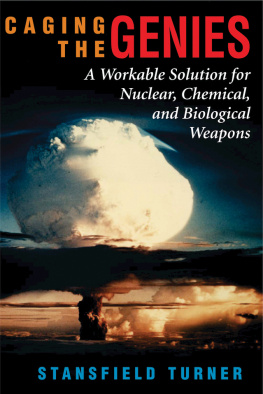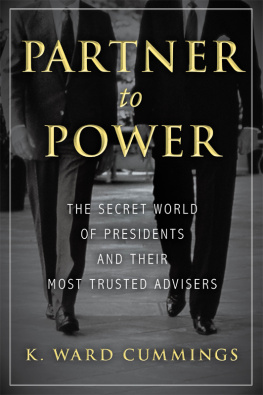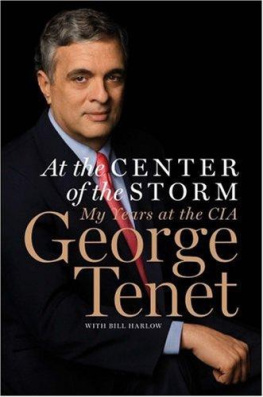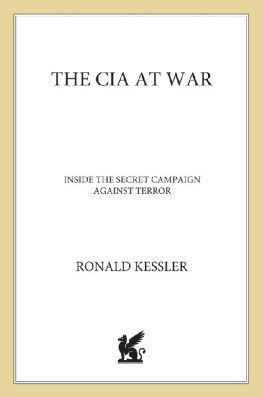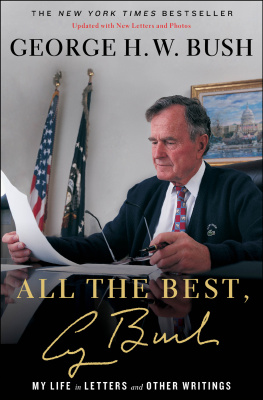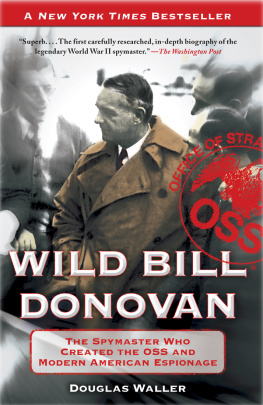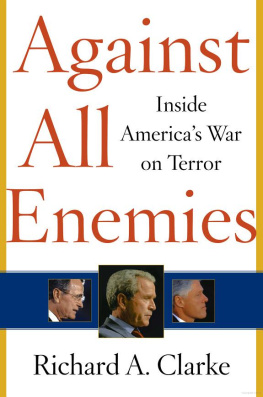


To Marion
Whose perceptive advice and constant encouragement made this book possible
Contents
Americas First Central Intelligence Apparatus
The Founding of the CIA
The CIA Is Thrust into Action
Scandal and Confusion on the New Frontier
The Value and Price of Loyalty
The CIA Despised
The CIA Under a Microscope
The DCI Empowered
The Resurrection of Wild Bill
Confusion and Compromise at the Cold Wars End
The CIA Without the Cold War
Quo Vadis?
T his book was inspired by a suggestion from my good friend and literary agent Bill Adler. Ironically, though, the book is nothing like Bills original concept. That was for a compendium of true spy stories. With the advent of the events of 9/11, Bill, Hyperion, and I decided that a more substantial look at the state of American intelligence was in order, and that is what this is.
Gretchen Young of Hyperion offered invaluable advice along the way. Jim Wade was a most useful editor as we came down the home stretch.
My close friends and longtime associates in the Navy and the CIA, George Thibault and Charles Battaglia, provided absolutely invaluable advice on the substance of the book and on editing it.
Because the book deals so much in the personalities of presidents and chiefs of intelligence, it was most important for me to be able to view those people through the eyes of others who knew them well. I am intensely grateful to many individuals for granting me the interviews that enabled me to do that. These were:
Former presidents Gerald Ford and Jimmy Carter in person; George H. W. Bush by correspondence; and Dwight Eisenhower in the person of his son John.
Former Directors of Central Intelligence James Schlesinger, William Webster, Robert Gates, James Woolsey, John Deutch, and Deputy Director of Central Intelligence Bobby Inman.
Former Secretary of Defense Harold Brown.
Former Assistants to the President for National Security Brent Scowcroft and Zbigniew Brzezinski.
Former members of the OSS Fisher Howe and Ned Putzell.
Former CIA historian J. Kenneth McDonald.
Executive Director of the International Spy Museum and former member of the CIA Peter Earnest.
Experts and writers on intelligence David Kahn and Robert Dallek.
Finally, the support, advice and encouragement of my executive assistant, Pat Moynihan, was both unstinting and essential.
All statements of fact, opinion, or analysis expressed are mine and do not reflect the official positions or views of the CIA or any other U.S. government agency. Nothing in the contents should be construed as asserting or implying U.S. government authentication of information or Central Intelligence Agency endorsement of the authors views. This material has been reviewed by the CIA only to prevent the disclosure of classified information.
T he fact that the events of 9/11 occurred without warning was a failure of our system of collecting and evaluating intelligence. It was a failure that ranks even higher than Pearl Harbor. The fact that we invaded Iraq in 2003 on the assumption that there were weapons of mass destruction there was another serious failure of intelligence. Consequently, the publics attention is focused today on our nations intelligence apparatus as never before.
It should be obvious to the public that the intelligence organization we established in 1947 is not serving us adequately. It consisted of a director of central intelligence (DCI) to coordinate all intelligence activities, a single Central Intelligence Agency (CIA) to serve the countrys overall needs for intelligence, and a series of intelligence bureaus within various departments of government to serve both national and departmental needs. Over the fifty-eight years since this organizational arrangement was established, numerous commissions have studied how well or poorly it has been working. The majority of theseand they go back some fifty yearshave come to the conclusion that stronger central direction of the intelligence apparatus is needed. For one reason or another, we were not able to move very far in such a direction until December 2004, when Congress passed legislation restructuring our intelligence organization. The ink was hardly dry on that, however, before there were calls to redo it because there were too many ambiguities in the new law.
We, the public, need to understand whether that truly is the case, because today a great deal hinges on the effectiveness of our intelligence apparatus. The primary threat to the country has shifted from one of military attacks to one of terrorist acts. In combating terrorism, intelligence must be our first line of defense. If we cannot stop terrorists from committing heinous deeds, but can only respond after the fact, we will lose much of what our country stands for. Already our society is considerably different as a result of the actions we have found it necessary to take to ward off terrorists. The more such actions we feel compelled to take, the more we lose.
Our public, then, deserves to understand why it took so long to correct the flaws in our intelligence system, even though they have been pointed out repeatedly, and whether the changes that were finally made are the best we can do. This book seeks those answers through studying how each president from Franklin D. Roosevelt to George W. Bush has interacted with his DCI and how those relationships have shaped the position of DCI into what it is today. Hopefully, understanding how we got to where we are will help us understand where we should go next. Making the right move could be vital to our future as a nation.
FRANKLIN D. ROOSEVELT AND WILD BILL
Americas First Central Intelligence Apparatus
T he teams of OSS officers and enlisted men on the ground were trained to expect and anticipate almost anything. They were trained to operate well behind enemy lines, in this instance in Burma during World War II. But no one had prepared them for a visit by their own commander, William Wild Bill Donovan, brigadier general and head of the Office of Strategic Services (OSS). He held an incredible storehouse of American military secrets in his head; he really shouldnt have exposed himself to the risk of being captured.
But Donovan was, in the words of his assistant, Ned Putzell (who was also on this trip), the sort of leader who couldnt ask somebody to do something he himself wouldnt do.
Never since Donovan has one of Americas spymasters been so deeply involved in operations. None of his successors would have dreamed of making a clandestine visit behind enemy lines. To be honest, when I was director of central intelligence, I considered myself a manager, nothing more. But Wild Bill Donovan, who got the ball rolling, couldnt shake the romance of the profession. He had to live it.
Now, Donovan didnt come to the job with any intelligence experience to speak of. He was a lawyer. He was not a close friend of Franklin D. Roosevelt. In fact, he was a Republican. So how did such an unlikely character end up crafting Americas first centralized intelligence service?
Preparing for war, a war that would propel America permanently onto the world stage, President Franklin Roosevelt made some changes at home. With incredible political dexterity, he threw the Republican National Convention of 1940 into disarray by appointing two Republicans, Frank Knox and Henry Stimson, to his cabinet. Knox would become secretary of the navy and Stimson, who had served under President Hoover just a few years before, would be secretary of war. Both believed, as did the president, that the war that had broken out in Europe in 1939 would inevitably, and soon, involve the United States. Roosevelt did not know at the time that he had just paved the way for Donovan to enter his inner circle of advisors, and that doing so would lead to the creation of Americas first full-fledged intelligence service.
Next page
